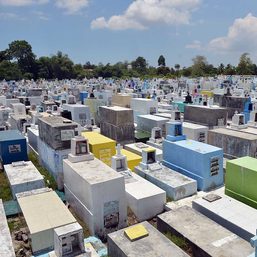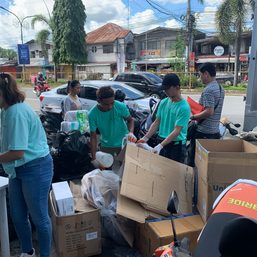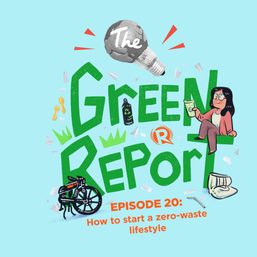SUMMARY
This is AI generated summarization, which may have errors. For context, always refer to the full article.

MANILA, Philippines – As the traditional commemoration of Undas is fast approaching and millions of Filipinos are anticipated to flock to cemeteries all over the country, waste is expected to accumulate in gravesites.
In observance of All Saints’ Day and All Souls’ Day on November 1 to 2, what better way to honor your departed loved ones than by observing cleanliness at cemeteries and other final resting places?
Here are some cemetery etiquettes that visitors can practice to achieve a clean and green Undas commemoration, according to environmental groups EcoWaste Coalition and Greenpeace Philippines:
Food and drinks
- Buy drinks from refill stations.
- Choose food stalls that use nondisposable materials.
- Opt for meals cooked at home to reduce consumption of food with disposable packaging, and make sure to bring only the amount you can consume to avoid spoilage.
The Department of Health also encouraged bringing your own food and water to mitigate the risks of diseases.
Reusable all the way
- Reusable containers and cutleries, lunch boxes, cloth napkins, among others, are your friends. When eating out, ask for reusable utensils instead of single-use cutlery.
- Use water jugs (preferably large refillable water containers) for drinks instead of buying bottled water.
- As much as possible, refuse plastic bags from vendors when purchasing. Bring your own bayong or eco-bag.
Keeping waste to a minimum
- Do not leave trash to avoid pest problems in cemeteries.
- Avoid littering. Throw your trash in the designated bins in accordance with the type of waste: plastic, paper, can and glass, and biodegradable.
- If possible, do not create trash in the first place.
- When purchasing, always go for products with the least amount of packaging and avoid single-use containers.
Others
- Use lead-free candles.
- Bring potted plants or fresh flowers instead of artificial ones.
- Use toilets and urinals properly and keep them clean. Refrain from defecating and urinating in public areas.
- Avoid smoking at the cemetery in consideration of children, pregnant women, and people with respiratory illnesses.
“A waste-free celebration of Undas is requisite in honoring the final resting place of our deceased loved ones,” said Ochie Tolentino, zero waste campaigner for EcoWaste Coalition.
The EcoWaste Coalition also called for the strict implementation of Republic Act No. 9003 or the Ecological Solid Waste Management Act of 2000, which aims to reduce waste volume.
Meanwhile, Greenpeace Philippines urged cemetery managements to:
- Install water refilling stations to reduce purchase of bottled water or drinks.
- Encourage vendors to use refilling dispensers and invite customers to use reusable drink holders.
- Place adequate waste bins with proper segregation labels in visible locations at the cemetery.
- Discourage vendors from selling products with single-use packaging.
“People always think when you’re going for a zero-waste or plastic-free life that means sacrifices and depriving yourself of things you like, but it’s just about making conscious choices where to go and what to avoid, and being prepared for different situations,” Marian Ledesma, zero waste campaigner for Greenpeace Philippines, told Rappler.
She also stressed that avoiding single-use plastics reduces one’s carbon footprint and lowers health impacts and social inequalities caused by the toxic pollution from the “plastic life cycle,” which produces greenhouse gases.
“Given 99% of plastics are from fossil fuels, reducing the production and use of plastics in businesses and communities is one form of climate action. Equally important is that by avoiding single-use plastic, we can prevent waste and pollution while also preventing/lowering health impacts and social inequities,” Ledesma said.
The Philippines generates approximately 61,000 metric tons of garbage every day, Environment Secretary Antonia Yulo-Loyzaga said during the Extended Producer Responsibility campaign launch in August. According to her, Filipinos use more than 163 million sachet packets, 48 million shopping bags, and 45 million thin-film bags daily.
At least 196 metric tons of garbage were collected in Manila North and Manila South Cemetery alone during Undas in 2022, according to the Metropolitan Manila Development Authority. – Kaela Patricia Gabriel/Rappler.com
Kaela Patricia Gabriel is a Rappler intern. She is currently taking up BA Journalism at the University of Santo Tomas.
ALSO ON RAPPLER
- IN CHARTS: The rising cost of grieving, dying in the Philippines
- Undas 2023: Airport, bus terminal, train, road advisories and schedules
- Undas 2023: Cemetery schedules, guidelines in Metro Manila
- Rappler Talk: Into the mind of an exorcist
Add a comment
How does this make you feel?
![[WATCH] In the Public Square with John Nery: Who’s afraid of death anyway?](https://www.rappler.com/tachyon/2023/11/In-the-Public-Square-LS-SQ-3.jpg?resize=257%2C257&crop=381px%2C0px%2C1080px%2C1080px)























There are no comments yet. Add your comment to start the conversation.